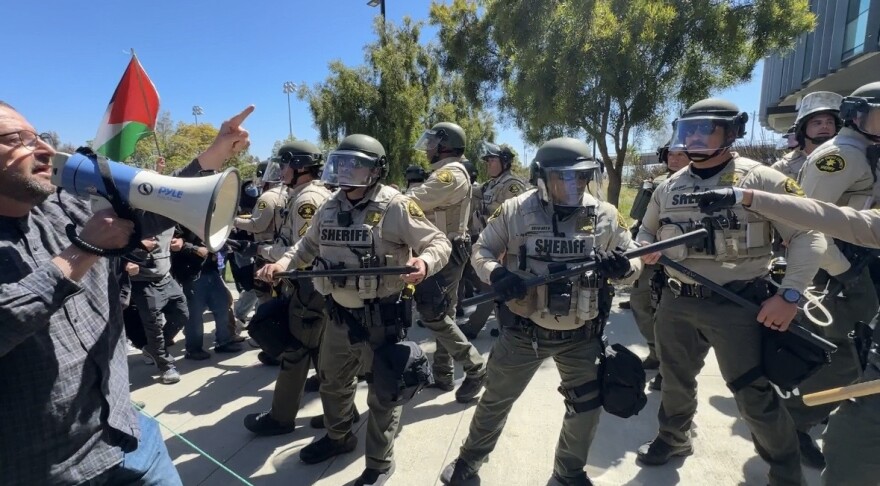Protesters have begun dispersing at the UC San Diego campus Monday, following the dismantling of the Gaza Solidarity Encampment. Earlier this morning, there were tense moments between protesters and law enforcement.
Shortly before 11 a.m., protesters had pushed sheriff's deputies back against the Structural & Materials Engineering building. Deputies wore helmets and protective armor while holding batons.
"Shame on you, put it away!" a protestor chanted. "We're unarmed!" another shouted.
At press conference later in the day, Imam Taha Hassane, director of the Islamic Center of San Diego, said he was pepper sprayed. Video posted on Instagram by San Diego chapter of the Palestinian Youth Movement shows deputies spraying pepper spray into the crowd of protesters.
Shortly after 11 a.m., protesters encircled the doors of the UC San Diego Price Center food court, barricading them with some law enforcement inside.
About 30 minutes later, the crowd at the Price Center began to disperse.
"UC San Diego Police report 64 arrests in the dismantling of the illegal encampment on campus this morning," read a statement from UC San Diego officials. "Of those, 40 were students and 24 were unaffiliated or their status is unknown at this time. The arrested students have been or will be placed under immediate interim suspension."
Earlier Monday morning, the California Highway Patrol encircled a group of protesters at the Gaza Solidarity Encampment at UC San Diego, taking down tents and arresting dozens of protesters.
The camp was cleared later that morning.
A statement from the university Monday morning said, "University of California Police, CHP and the San Diego County Sheriff's Department successfully and peacefully dismantled an illegal encampment on the UC San Diego campus."
According to the school, two minor injuries were reported.
The action involved about 200 campus police, the California Highway Patrol and the San Diego County Sheriff's Department.
Morgen Chalmiers, a UCSD student and one of the protest organizers, described the arrests as a violent action against peaceful students.
"Today, we saw UCSD administration willfully endanger communities of color, undocumented individuals, and other marginalized groups, whom we know are at a disproportionate risk of state violence," Chalmiers said. "Today we also witness the invasion of Rafah by the Israeli Occupation Forces, who train San Diego police, and we recognize the ties between militarism, police violence, and repression on our campus and the ongoing genocide in Palestine."
"Genocide" is a legal term. There is a case before the International Court of Justice alleging Israel is engaging in genocide. It is pending a ruling, which could take years.
Source: International Court of Justice
Authorities declared the encampment an unlawful assembly at about 5:45 a.m. Monday. Officers ordered the protesters to leave.
Chancellor Pradeep Khosla released a statement Monday saying "the decision to clear the campsite was made due to consideration of the significant dangers to people inside and outside of the encampment."
Wooden stakes, propane tanks, metal and plywood shields, aerosol spray cans and a sword were among items cleared from the encampment, according to the chancellor's statement. Khosla cited these items as "unacceptable hazards for health, fire safety and security."
Classes at UCSD moved to remote teaching Monday. All events on the West Campus were canceled and all facilities were closed.
A San Diego Police Department watch commander said officers are standing by in case they are needed to help the CHP.
The San Diego Metropolitan Transit System said on social media Monday morning that due to police activity, the UC San Diego Central Campus Trolley Station is temporarily closed. Trains will bypass the station. The Gilman Transit Center is also closed and buses are detouring around the police activity.














